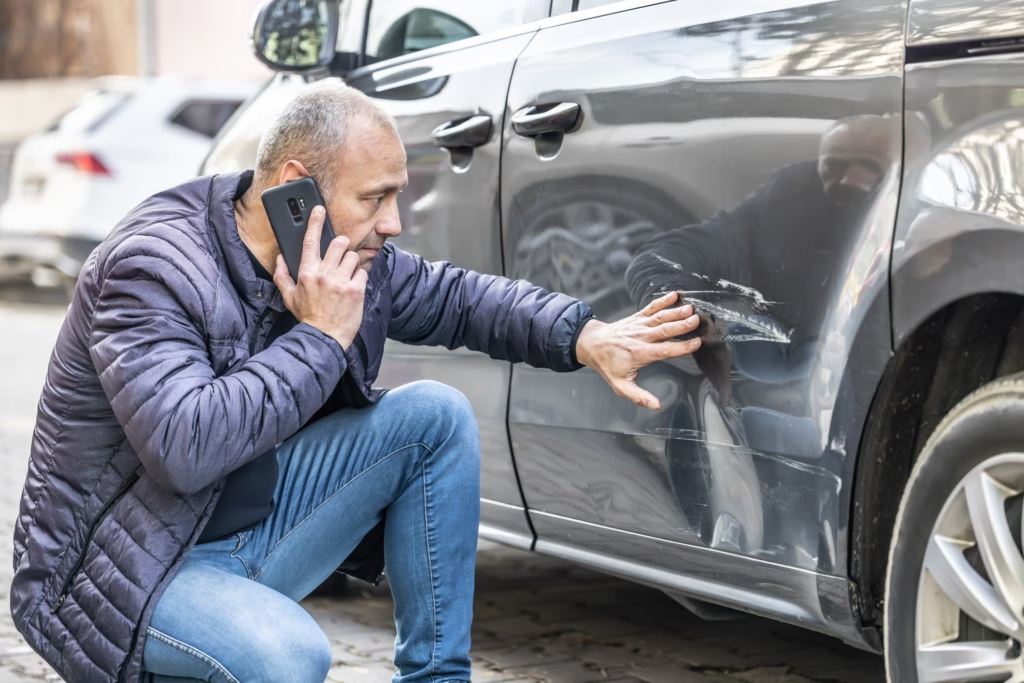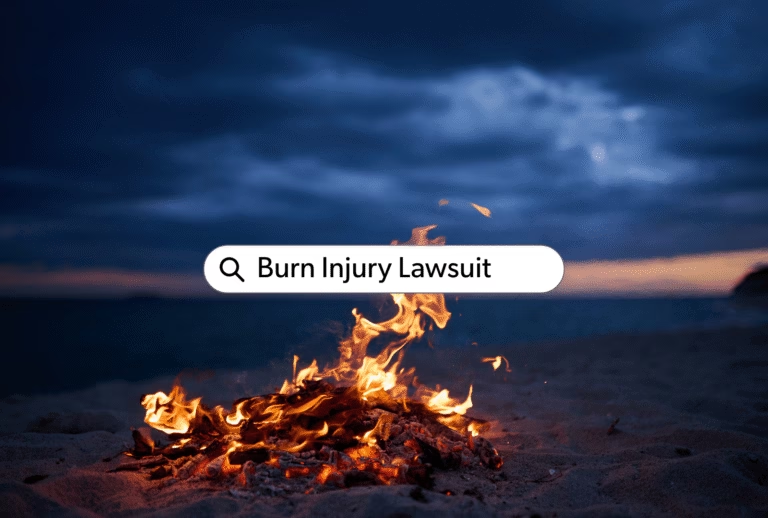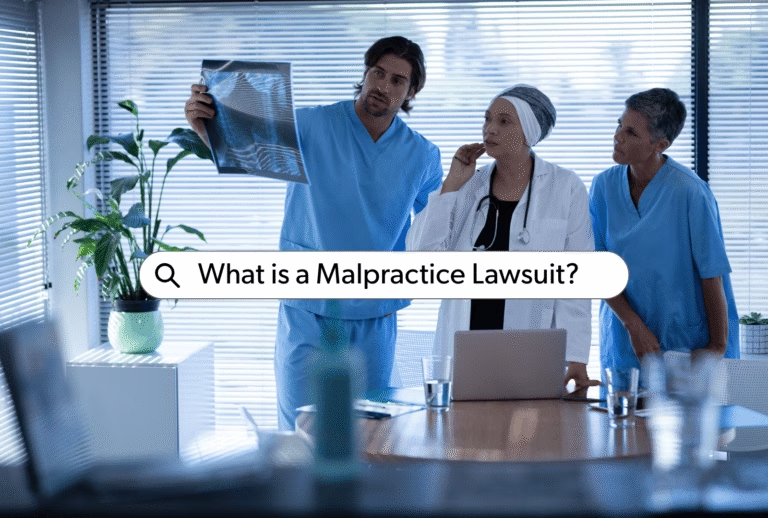Isn’t hitting a parked car the absolute worst? Not only is it a major interruption to an otherwise normal day, but it can also be expensive to rectify. If you hit a parked car, do not flee the scene. Fleeing can result in larger fines and may lead to criminal charges. Many people might drive off after hitting a parked car because they think authorities will not be able to find them. However, witness statements and parking lot security cameras are usually able to identify any vehicle in the parking lot. There are several steps you should take to ensure everyone’s safety and minimize the amount of damages you have to cover out of pocket.
Steps to Take After Hitting a Parked Car
Hitting a parked car isn’t as uncommon as you might think. Usually during peak hours in a crowded parking lot can cause extra chaos that leads to driver error.
- Don’t leave the scene: Leaving the scene without providing contact and insurance information can lead to a misdemeanor hit and run, which is subject to stiff fines and up to 1 year in prison.
- Leave a note: If you are unable to find the car’s owner, you have the legal obligation to leave a note that provides your contact details. The note should include your name, address, contact information, and a brief description of the incident. If the damages exceed $1,000 you should report the accident to the Department of Motor Vehicles (DMV) within 10 days.
- Record the scene: Documenting the incident can help support your case and prevent you from paying for any additional damages that you did not cause. You should take photos of the vehicle damage, as well as any damage on your car. Taking photos of the scene can make all the difference to give context for the accident and show any nearby property damage (if any). Remember to document license plates and VINs of any vehicles involved in the car accident.
- Alert the Authorities (if necessary): If damage is severe enough or someone is hurt, notify authorities immediately. The safety of everyone involved is of the utmost importance. With severe vehicle damage, there may be a risk of a fire or explosion. Calling emergency services will help prevent further injury or property damage to everyone involved. Their involvement will also allow the authorities to file a police report, which may clear up liability with regard to who’s at fault.
- Call the Insurance Company: Many insurers require prompt notification after an accident. By failing to report the incident, you may lose the right to file an insurance claim. Reporting the accident early also helps establish an official timeline, which can protect you if the other driver later claims additional damages. Be honest and detailed when describing the incident, but avoid admitting fault until your insurer completes their investigation.
- Contact a Personal Injury Attorney: You could be liable for lots of damage, and you never want to pay more than you have to. Even if you think you’re at fault for hitting a parked car, it’s possible that the liability falls on the owner of the parked vehicle. For example, if the vehicle was illegally parked, or if it was parked in a way that obstructed traffic, or was difficult to see. In instances where the parked car’s owner was at fault, you may not be liable to pay nearly as much.
What To Do if You Hit a Parked Car but No Damage?
If you hit a parked car and don’t see any visible damage, it’s still important to follow the proper steps. Even if the impact was light, there could be hidden damage like a dent in a bumper, scratched paint, or a loosened panel. Failing to report the incident, even when the damage seems minimal or nonexistent, could still be considered a hit-and-run under California law. You are legally required to leave your name, contact information, and a brief explanation of what happened, either by finding the owner, or leaving a note on the windshield.
Taking photos of both vehicles and the surrounding area is also a smart move. Documentation of the incident can protect you in case the vehicle owner later claims damage you didn’t cause. It may feel unnecessary to report a seemingly harmless tap, but it can lead to serious legal or financial trouble later on.
Does Insurance Cover a Hit and Run?
If you commit a hit and run, it’s not uncommon for insurance to deny your claim. However, in some circumstances, they will still cover you for the hit and run. The company will also likely raise your insurance rates after the claim. It’s best to always leave a note and avoid a nasty situation with your insurance company.
If you’re the victim of a hit and run, insurance will usually cover it. However it may depend on the type of coverage you carry. If you have uninsured motorist property damage coverage (UMPD) or collision coverage, your insurance will likely help pay for the damages, even if the at-fault driver is never identified. However, if you only carry liability coverage, you may have to pay for repairs out of pocket.
It’s important to report the incident to both the police and your insurance company as soon as possible. A police report can strengthen your claim, and prompt reporting ensures you stay within your insurer’s required time limits. Keep detailed documentation, including photos of the damage and any witness information, to support your claim.
Penalties for Hit and Run
A hit and run is usually a misdemeanor with up to six months in jail and fines of up to $1,000. Other hit and run penalties include up to three years of probation, restitution for property damage, and points off your driving record. In rare cases, you may be charged with a felony when the car accident involves the injury or death of a person.
Damages That Can Be Claimed
If you hit a parked car, you or your insurance provider may be responsible for covering damages, especially if you were at fault. The most common claimable damages include:
- Vehicle Repair Costs: Vehicle repair costs may cover any visible damage to the parked car, such as dents, scratches, broken mirrors, or damaged bumpers. Even minor damage can be costly, depending on the make and model of the car.
- Replacement Value: If the parked car is totaled, meaning the cost to repair exceeds the car’s value, you may be responsible for covering the fair market value of the vehicle.
- Rental Car Expenses: While the other vehicle is being repaired or replaced, the owner may need a rental car. Any transportation or rental car costs can also be included in the claim.
- Towing or Storage Fees: If the damage leaves the car totaled, towing and storage costs may also be included in the total damages.
- Diminished Value: In some cases, the owner may claim that the car’s resale value has decreased due to the accident, even after repairs.
If your insurance includes collision coverage, it may also help cover the damage to your own vehicle. Always document the scene thoroughly and report the incident to your insurer promptly to preserve your right to coverage.
Mr. Justice Contact Info
At Lawyers for Justice, P.C., our legal team specializes in recovering as many expenses as possible for you after a car accident. As personal injury attorneys, we specialize in a wide array of cases, including Car Accidents, Bus Accidents, Motorcycle Accidents, Dog Bites, Slip & Fall, and Workplace Injuries. We know that dealing with an injury can be both painful and expensive, which is why we handle all the bureaucratic work, so you can focus on recovering.
We handle everything from filing your injury claim to gathering evidence, and even negotiating with insurance companies on your behalf. We will even handle the lawsuit if it goes to court. Our legal professionals will be there to guide you with any advice you need along the way, and we guarantee we won’t settle for anything less than you deserve.
Compensation could be just a phone call away: (818) JUSTICE
450 N Brand Blvd #900, Glendale, CA 91203
Last Updated on July 3, 2025



